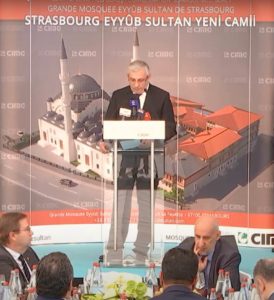Abdullah Bozkurt/Stockholm
In the past decade Franco-Turkish nationals have emerged as one of the leading categories of individuals stripped of French citizenship over terrorism charges linked to jihadist organizations such as the Islamic State in Iraq and Syria (ISIS) and al-Qaeda, as France has increasingly turned to the revocation of nationality as part of its counterterrorism strategy, particularly against dual nationals implicated in extremism.
This development is an unprecedented phenomenon within the Turkish diaspora in Europe. Analysts partly attribute the trend to the Islamist government of President Recep Tayyip Erdogan in Turkey, which has clandestinely collaborated with jihadist groups abroad to advance its foreign policy goals, most notably in Syria following the outbreak of civil war in 2011.
The Erdogan government’s policy decisions, its pro-jihadist ideological leanings and its virulent anti-Western rhetoric have acted as catalysts, making Turks more vulnerable to radicalization. These influences, combined with local and personal drivers unrelated to Turkey, have shaped a troubling pattern of radicalization in the Franco-Turkish community.
In recent years France, home to an estimated 1 million people of Turkish origin, has become one of the most frequent targets of Erdogan’s accusations. Turkish officials have repeatedly accused Paris of attacking Islam, fueling hatred of Muslims, stigmatizing Muslim communities and deliberately pursuing an anti-Islam agenda.
Ünzile Nur Sert, a Turkish national, was stripped of her French citizenship following a conviction for involvement with ISIS; her appeal was rejected by the Conseil d’État, which ruled that the government’s decision was lawful:
“What we are facing is not Islamophobia, that is, fear of Islam, but outright hostility toward Islam. Yes, the disease of enmity against Islam is spreading rapidly across much of the world, particularly in the West, like a cancerous cell,” Erdoğan said in a speech on May 25, 2021.
“The current wave of hostility toward Islam is being carried out with far more insidious and calculated methods. The strategy of demonizing Muslims, launched by the US administration after the September 11 attacks, has served to activate the pre-existing virus of anti-Islamic sentiment embedded in many societies’ cultural structures.”
He then criticized France for spearheading this campaign in Europe. “Today, in Europe certain countries led by France are making concerted efforts to reshape Islam according to their own preferences. Attacks targeting the Holy Qur’an, our Prophet (peace and blessings be upon him) and religious symbols, particularly the clothing choices of Muslim women and men, are being openly sanctioned and, therefore, supported by states themselves.”
Through its intelligence service (MIT) and state-controlled media, Erdoğan’s government has mobilized proxy groups in France to amplify these narratives, advance Ankara’s interests and orchestrate an anti-French disinformation campaign. These efforts have not only polarized the diaspora but also weakened the sense of allegiance of some Franco-Turkish nationals to their adopted country. Jihadist recruiters have exploited these grievances to draw vulnerable individuals into extremist networks.
Unsurprisingly, the French security services have increasingly scrutinized Franco-Turkish nationals not only for suspected ties to extremist organizations but also for links to the Erdogan government and activities deemed contrary to French national interests.
Turkish President Recep Tayyip Erdogan has accused France of leading a campaign against Islam:
Court cases over the past decade highlight just the tip of the iceberg of the challenges French authorities face in countering radicalization and mitigating the covert influence of Turkish state-backed operations. At least a dozen Franco-Turkish nationals have been investigated, charged and convicted on terrorism-related offenses, leading the government to revoke their citizenship under relatively recent counterterrorism provisions.
France’s revocation of nationality is grounded in Articles 25 and 25-1 of the Civil Code, which authorize the state to strip dual nationals of their citizenship if they commit acts that threaten national security, including terrorism. The process involves notification by the Ministry of the Interior, an opportunity for the individual to present a defense, a binding opinion from the Conseil d’État and a final decree signed by the prime minister. Revocation is considered an administrative measure, distinct from judicial punishment.
One of the most high-profile cases is that of Ünzile Nur Sert, the first woman to be stripped of French nationality. Born in Lyon in 1990 to Turkish parents, she acquired French citizenship in 2010. Her radicalization began in her late teens, driven by jihadist propaganda online. In March 2016 Sert and accomplices plotted attacks on Parisian targets, including a concert hall, cafés and a shopping center.
Investigators discovered she had twice attempted to travel to Syria and Iraq to join ISIS and had declared her intent to “do better than the Bataclan,” referring to the November 2015 ISIS massacre that killed 90 people at the Bataclan concert hall.

Convicted in 2017, she received a five-year sentence, including six months suspended, and was released on parole in 2019. In February 2023 decree revoked her nationality. Her legal team argued that the measure was disproportionate and politically motivated, stressing her rehabilitation. However, in May 2023 the Conseil d’État upheld the revocation, ruling that the administrative sanction was separate from her completed criminal sentence.
Another case involved Hicret Güneş, born in Belfort in 1986, who traveled to Syria between 2014 and 2016 to fight alongside jihadist groups Jabhat al-Nusra and Ahrar al-Sham, both designated as terrorist organizations. These groups were widely reported to have received logistical and political backing from the Erdogan government, which facilitated the passage of foreign fighters through Turkish territory. On his return to France, Güneş was arrested, convicted and sentenced to eight years in prison in 2020. In March 2024 the government formally revoked his French nationality, leaving him solely with Turkish citizenship.
Another Franco-Turkish national was Sedat Hot, born in Montbéliard in 1984. Between 2014 and 2016 Hot played a key role in facilitating the travel of foreign fighters to Syria on behalf of ISIS. He recruited volunteers and coordinated logistics, providing vital support to ISIS’s overseas operations. In 2020 the Paris Special Assize Court sentenced him to nine years in prison. His French citizenship was revoked by decree in October 2024.

Mustafa Savaş, born in Wissembourg in 1992, radicalized with childhood friends, including Foued Mohamed-Aggad, who later joined ISIS in Syria in 2013 and became one of the Bataclan suicide bombers. Aggad detonated explosives inside the concert hall during the November 2015 Paris attacks, killing himself and contributing to the massacre. Savaş himself attempted to travel to Syria twice: first in December 2013, when his father stopped him at Frankfurt Airport and again in 2016, when he attempted to cross via Turkey but was intercepted at the Slovenian border. In 2018, he was sentenced to eight years in prison for his involvement in terrorist conspiracies abroad.
Tuncay Durmaz and Tugay Durmaz, twin brothers born in Gien, initially served in the French army and later worked as private security agents before radicalizing online in 2014. That year, they traveled via Turkey to Syria, where they joined ISIS, received training and carried out surveillance and combat missions. They returned to France later in 2014 but were not arrested until 2016. Convicted of association with a terrorist organization, both received six-year sentences. In March 2023, their French citizenship was revoked.
Mesut Şekerci, born in Évreux in 1995, was suspected of joining an al-Qaeda–affiliated faction in Syria in 2013 at just 18 years of age. Convicted in absentia in April 2016, he was sentenced to 10 years for participation in a jihadist financing network. He remains at large, believed to still be in Syria. In March 2022 a decree formally revoked his nationality.
Beyond these examples, several other Franco-Turkish nationals have also lost their citizenship for terrorism-related offenses. Collectively, Turks rank just behind Moroccans and Algerians among the largest groups of individuals of foreign origin stripped of French nationality for jihadist activity.
France’s growing reliance on citizenship revocation underscores how administrative tools are being deployed along with judicial measures to combat terrorism. For Franco-Turkish nationals, these cases highlight the complex challenges of dual allegiance in an era of globalized terrorism and transnational jihadist networks.












